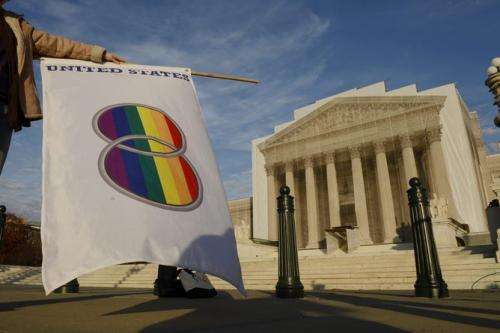US Supreme Court wades into same-sex marriage debate

The United States Supreme Court has a history of playing a pivotal role in emotive cultural debates including, for example, abortion (Roe v Wade), racial segregation (Brown v Board of Education) and the death penalty (Roper v Simmons).
Marriage equality will now join this list. In a much anticipated move, the US Supreme Court announced on Friday that it will hear two cases relating to same-sex marriage. The case of Hollingsworth v Perry is from California and relates to whether Proposition 8 (a ballot amending the state constitution to define marriage as being between a man and a woman) is unconstitutional on the basis that it violates the Equal Protection clause of the United States Constitution.
The other case is Windsor v United States from New York, which will require the Supreme Court to consider whether the Defense of Marriage Act (DOMA) which was signed into law by President Bill Clinton, is unconstitutional. DOMA is a Federal Act that defines marriage as being between a man and a woman and on this basis denies same-sex married couples the same benefits and programs enjoyed by opposite-sex married under federal laws relating to tax, employment, health and so on.
The Supreme Court will hear arguments on these two cases in late March and is likely to deliver its judgments in late June 2013. The cases have many nuances and which way the court will rule is anyone's guess. Indeed, the cases may not even be decided on the merits.
For example, the nine judges could determine both cases on narrow procedural grounds. This is because both cases involve questions of "standing", that is, whether the parties are even entitled to argue the cases before the Supreme Court. Article III of the US Constitution limits the jurisdiction of the Supreme Court to cases involving parties who have suffered a direct loss or injury; an ideological objection is not sufficient to justify standing.
The Obama administration and the Californian government both consider that the provisions being challenged (DOMA and Proposition 8) are unconstitutional and have therefore declined to defend them. In light of this, the Republican-controlled House of Representatives has decided to step in and defend DOMA, and a group called ProtectMarriage is seeking to defend Proposition 8.
The Supreme Court has expressly requested the parties to address the Court on the question of standing. A finding that one or more parties lack the standing to argue these cases would end the appeals. Were this to occur, the lower court decisions would stand, which in both cases were in favour of marriage equality i.e. that Proposition 8 in California and DOMA are both unconstitutional. Such a decision would deprive the parties of the definitive ruling from the highest court which would have national impact.
I am not so bold as to try and predict which way the Supreme Court might decide these two cases. But what I will say, is that the judgements will be keenly awaited by both advocates and opponents of marriage equality, and will have repercussions across the United States, where nine states allow same-sex couples to marry, leaving 41 states that do not, including 30 which have expressly amended their constitutions to ban same-sex marriage.
Thus, within America, the fact that nine judges of the Supreme Court will decide this hot-button issue has been greeted with a mixture of hope and fear.
Some are concerned that it is too early for the Supreme Court to find a ban on same-sex marriage unconstitutional. They look at the fact that when the Supreme Court found laws criminalising sodomy to be illegal there were only 13 states which still retained the offence of sodomy; when laws prohibiting inter-racial marriage were found to be unconstitutional only 16 states still banned such marriages; and when segregation in schools was struck down, only 17 states still had segregated schools. Thus, historically, the US Supreme Court reflects society's values, rather than dictates what those values should be.
The view that the Supreme Court should not move too fast on social issues was recently endorsed by Justice Ruth Bader Ginsburg who observed that while the decision in Roe v Wade was the right one, it was too fast and may have contributed to the bitter debate surrounding abortion that continues in the United States to this day. This insight into Justice Ruth Bader Ginsburg's thinking suggests that she might not be in favour of creating a landmark decision regarding marriage equality.
It would certainly be open to the court to find in favour of same-sex marriage in such a way that it allows California to retain marriage equality without invalidating the bans on same-sex marriage in other states. That is, the Court could find the amendment to the California Constitution to be invalid without making it mandatory for all states to legalise same-sex marriage. This course of action might be the most attractive to the Court – as it allows them to point the country in the right direction without risking the bitter division that followed Roe v Wade.
As well as having repercussions across the United States, the Supreme Court's decision is also likely to have an impact around the world. Although the cases will be decided according to the US Constitution, the United States still has enormous global influence and what the US Supreme Court decides will have a bearing on how other countries view this issue.
Provided by The Conversation
This story is published courtesy of the The Conversation (under Creative Commons-Attribution/No derivatives).














